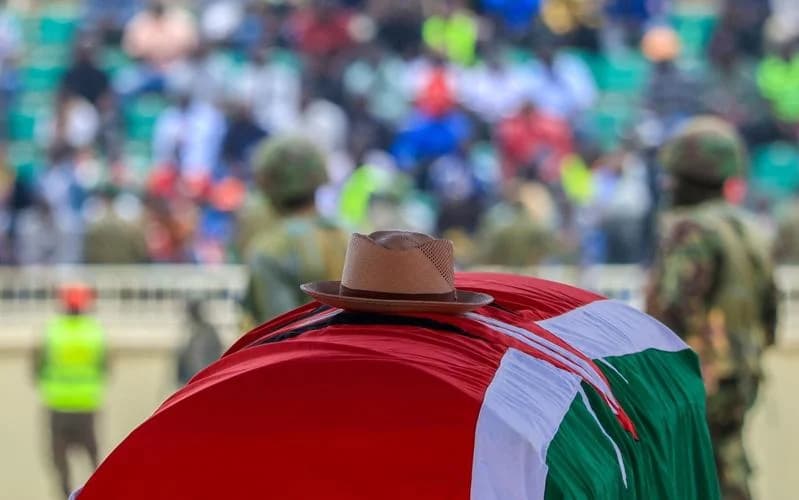We're loading the full news article for you. This includes the article content, images, author information, and related articles.
Kenyans in the diaspora are paying heartfelt tributes to the late Raila Odinga, remembering his pivotal role in the nation's democratic journey, including his period of exile and relentless advocacy for reforms.

Kenyans living abroad have joined the nation in mourning the passing of former Prime Minister Raila Odinga, who died on Wednesday, October 15, 2025, in Koothattukulam, Kerala, India, at the age of 80. Tributes from the diaspora highlight his enduring legacy as a statesman, a champion of democracy, and a figure whose influence transcended Kenya's borders.
Many in the diaspora recall Odinga's deep connection with Kenyans abroad, particularly during critical political junctures. Bernard Kavyu, Governor of Diaspora County 48 Kenya, expressed profound sorrow, describing Odinga as a "visionary statesman and a tireless defender of justice, democracy and the rule of law." Kavyu specifically referenced Odinga's engagement with the diaspora during the 2022 General Election, which saw a virtual global rally attract over one million viewers worldwide.
Raila Odinga's political journey was marked by significant challenges, including periods of detention and exile. In 1982, he was detained for six years without trial, accused of involvement in a failed coup attempt against then-President Daniel arap Moi. Amnesty International recognised him as a "Prisoner of Conscience" in 1991 for his peaceful advocacy for multiparty democracy and constitutional reform.
Following his release, Odinga faced continuous surveillance and harassment, leading him to flee to Norway in October 1991. His escape was a perilous journey, reportedly involving disguises and multiple aliases, as he travelled through Uganda before reaching Europe. He returned to Kenya in February 1992, coinciding with the reintroduction of multi-party politics, and subsequently won the Lang'ata parliamentary seat.
Odinga's career was characterised by his role as a prominent opposition leader, consistently advocating for political reforms and challenging incumbent power structures. He made five unsuccessful attempts at the presidency in 1997, 2007, 2013, 2017, and 2022, often alleging electoral fraud.
Odinga played a crucial role in Kenya's constitutional reforms, particularly the promulgation of the 2010 Constitution. This landmark document enshrined key human rights protections and expanded civic freedoms. Danson Mukile, a Kenyan diaspora leader from the United States, highlighted Odinga's pivotal role in advocating for dual citizenship and diaspora voting rights, which reconnected millions of Kenyans abroad to the country's civic life.
His influence extended to economic policy, championing infrastructure development and devolution. As Minister for Roads, Public Works, and Housing (2003-2005), he initiated major projects that laid groundwork for Vision 2030. He also advocated for devolution, ensuring counties gained control over their budgets and priorities, a vision he termed "development where the people are."
Tributes have poured in from various leaders and Kenyans globally. The Chairperson of the African Union Commission, Mahmoud Ali Youssouf, described Odinga as "a towering figure in Kenya's political life and a steadfast champion of democracy, good governance, and people-centred development." Former President Uhuru Kenyatta referred to Odinga as "a father to the nation, a steadfast champion for the people, and a true son of Kenya." President William Ruto, while acknowledging their political differences, described Odinga as a mentor and a "man made through the fabric of struggle."
The Kenyan Embassy in Washington, D.C., organised a vigil where Kenyans in the United States gathered to honour Odinga, reflecting on his contributions to Kenya's political journey. Ambassador David Kerich praised Odinga's visionary leadership and commitment to democratic ideals, noting his influence reached far beyond Kenya's borders.
Odinga's passing marks the end of an era in Kenyan politics. His profound engagement with the nation's democratic evolution suggests that his absence will likely precipitate shifts in political alignments and the trajectory of democratic governance. The enduring lessons from his career highlight the critical need for deepened institutional reforms, particularly in electoral management and ethnic reconciliation, to ensure a more robust and inclusive democracy.
Despite his significant contributions, Odinga's political career was not without controversy. His alliances with successive presidents, sometimes after fierce political battles, were viewed differently by supporters and critics. For instance, his 2018 "Handshake" with former President Uhuru Kenyatta, while lauded by some for promoting national unity, was seen by others as a betrayal of the opposition's cause.
The question of whether his failure to be prosecuted after the 1982 coup attempt was a political deal with President Moi remains unanswered. Furthermore, unlike other political detainees, Odinga never produced a detention diary.
The political landscape in Kenya is expected to undergo significant changes in the wake of Odinga's death. Observers will be watching for potential realignments within political parties and coalitions, as well as the emergence of new leadership to fill the void left by his decades-long influence. The focus will also be on how the nation continues to address the issues of electoral integrity and constitutional reforms that were central to Odinga's political life.
Keep the conversation in one place—threads here stay linked to the story and in the forums.
Sign in to start a discussion
Start a conversation about this story and keep it linked here.
Other hot threads
E-sports and Gaming Community in Kenya
Active 9 months ago
The Role of Technology in Modern Agriculture (AgriTech)
Active 9 months ago
Popular Recreational Activities Across Counties
Active 9 months ago
Investing in Youth Sports Development Programs
Active 9 months ago
Key figures and persons of interest featured in this article